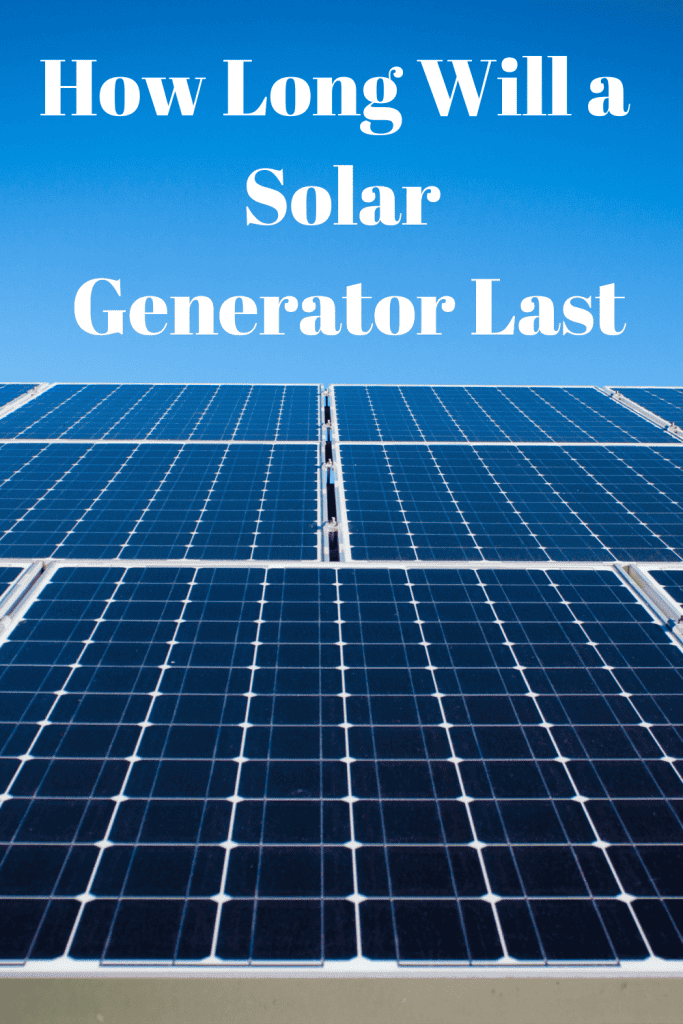How Long Will a Solar Generator Last? Overview
Solar generators’ operating duration depends on multiple factors, including their rated wattage, battery capacity and energy needs as well as charge controller and inverter models with different lifespans.

Modern solar generators often combine a charge controller, inverter and lithium iron phosphate batteries into one convenient package for maximum efficiency and long term life span.
The Quality of the Solar Panels
Quality solar panels play an essential part in determining how long your power system lasts. More efficient panels tend to produce more solar energy than lower-quality ones and tend to be more durable – for instance, you should choose panels capable of withstanding strong winds and rain; less resilient models may become damaged more quickly.
Consider how well solar panels perform in your climate. For instance, if you reside in an area prone to hurricanes or tropical storms, ensure your panels can withstand these weather conditions by opting for ones with a special surface that allows light-trapping – this may help them stay more effective at producing electricity during such times of weather conditions.
Consider the output rating and efficiency when assessing the quality of a solar panel. An output rating is a three-digit number which shows how much electricity can be produced under ideal conditions; higher output ratings require fewer panels to meet your energy needs while costing more than their lower-output counterparts.
Battery type and model in your solar generator will have a dramatic effect on its longevity. Lead-acid or lithium-ion are commonly used, and their lifespans typically span five-20 years depending on various factors.
Estimating how long your solar generator will last requires taking into account both battery capacity and device power demands, so using energy-saving appliances and not overcharging the battery are key components to its viability.
Remember, though, that solar generator performance can degrade over time due to wear and tear – this process is known as degradation and can result in your solar generator losing 0.5% of its energy production every year.
The Battery Capacity
A battery is one of the core components in any solar generator, storing electricity generated from solar panels to power devices during an outage. A good quality battery should last between 10-15 years with regular usage – however this depends on various factors.
First and foremost, battery capacity and power rating determine how long a single charge lasts; those with greater capacities can power multiple devices for longer before needing recharging. Battery type also plays a significant role – lead-acid batteries tend to last shorter while lithium-ion ones have greater longevity (and can cost more too).
Monitoring the power consumption levels of all your connected devices is also beneficial, enabling you to determine how long your generator can go before needing recharging and taking effective load management strategies such as limiting standby power use or restricting how many devices are powered at any one time.
Use and discharge cycles can have an impactful impact on battery longevity. Just as with phone batteries, each use cycle shortens solar battery lifespan; however, recent lithium iron phosphate (LiFePO4) batteries offer excellent longevity even when frequently utilized.

Storage conditions that promote optimal battery performance are of vital importance, to preserve its longevity and avoid temperature-induced damages. A garage or other protected environment would provide ample protection from weather elements.
Although a solar generator’s lifespan depends on several factors, its most significant influence comes from the battery. As such, it is vital to understand what makes a great battery so you can extend its lifespan as much as possible. By becoming informed on its importance and selecting one that meets both your needs and budget effectively you will reap all the rewards of solar energy for years to come!
The Battery Lifespan
Solar generators utilize lithium-ion batteries to store energy. Their lifespan depends on their capacity, size and power consumption of your devices; its lifespan also determines its frequency of charging/discharging cycles. One effective strategy to prolong battery lifespan is practicing effective load management – regularly draining down your generator to its minimum state of charge and not exceeding its recommended charging rates.
When purchasing a solar generator, you must also take into account how your household appliances consume energy. High-powered items like air conditioning units will deplete a battery quickly compared to lower power devices like LED lights and mobile phones. Furthermore, temperature has an impactful influence on how much power can be delivered; hotter climates reduce performance, whereas cooler environments extend its lifespan.
Depth of Discharge (DoD), another factor influencing battery lifespan, measures how far a battery can be discharged before showing signs of reduced efficiency. DoD calculations are expressed as percentages and it should be noted that batteries with higher DoD levels have shorter lifespans than those with lower ones.
Solar generator lifespan depends on their quality components; to extend their longevity, proper maintenance is key. When choosing a model of solar generator, make sure it comes with a solid warranty and premium-grade parts; properly maintained models can last up to 20 years without issue!
Solar generators come in many different sizes and styles, making them suitable for varying amounts of electricity usage. A larger capacity generator will power more appliances or devices while smaller models may only support less. Your choice of solar generator will also determine its lifespan; for instance a Delta Max from EcoFlow will power a refrigerator for 14 hours with one charge while more compact models may only support 100W devices for 6-8 hours at once.
Maintenance
Solar generators can help reduce your carbon footprint and energy costs while providing backup power during an outage. As an eco-friendly option to traditional gas-powered generators, solar generators offer long-term sustainability without needing replacement – yet understanding their lifespan and optimal maintenance practices are crucial for maximum performance.
A solar generator’s longevity depends on its components and how well they’re maintained, with higher-grade solar panels and batteries having longer lives than their low-quality counterparts. Regular maintenance will help your device avoid developing damage over time; for instance, wiping away dust and dirt from its solar panels and charging its battery to 100%; also ensure it is stored in an area free from direct sunlight (sunlight can lead to overheating).

Understanding how much power each appliance draws when connecting them to a solar generator is equally crucial. High-power appliances such as air conditioning units and power tools will deplete batteries more rapidly than low-powered electronics; this can affect how long a generator can run for and what appliances it can power. A power consumption calculator may be helpful in providing an estimate of your home energy use so you can plan appropriately.
Consider also how long a solar generator’s warranty period is before making your decision. Some manufacturers offer both equipment warranties for manufacturing defects as well as performance or power warranties to guarantee its ability to produce an adequate amount of electricity over its lifespan. Finding one with both types of warranties provides added assurance.
